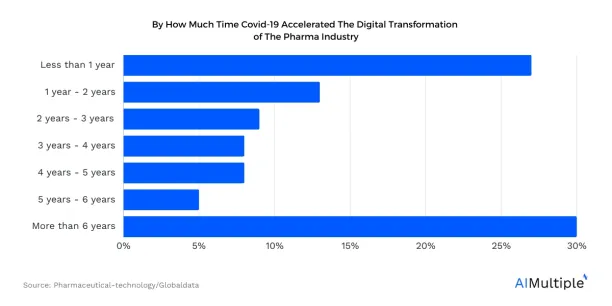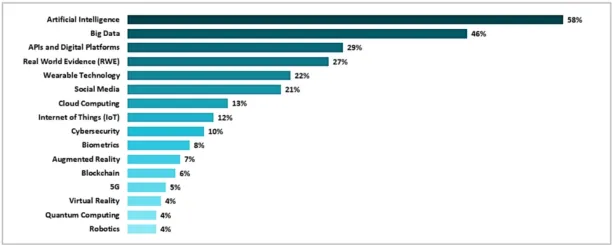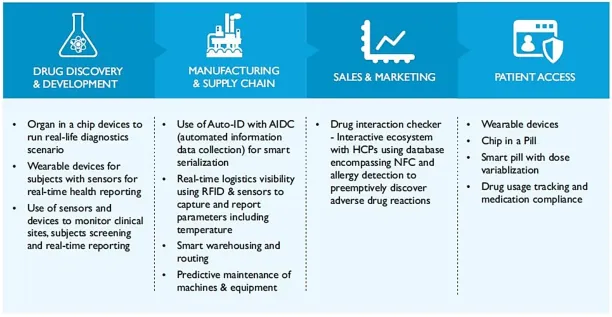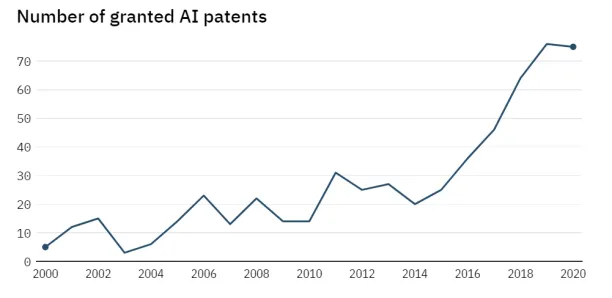Digital Transformation Pharma Trends & Technologies in 2024


Like every other industry, digital transformation is also revolutionizing the pharmaceutical sector. There has been a substantial increase in the digital health market since 2010, and according to a recent study, around 74% of respondents agreed that Covid-19 significantly accelerated digital transformation in the pharmaceutical and healthcare industry.
In another similar study, 35% of respondents specified that the sector had been digitally accelerated by more than 5 years (See Figure Below).1
Figure 1. Covid-19’s impact on the digital transformation of the pharmaceutical industry

However, impulsive investments in digital solutions can also lead to undesired outcomes, project failures, and, eventually, financial losses. We have curated this article:
- to put a spotlight on what digital transformation means for the pharmaceutical sector,
- explain why it is important for the sector,
- identify the key technologies being used in the sector,
- and list some real-world case studies of digital transformation in the pharmaceutical sector,
to help business leaders in the pharma sector better prepare for their current and future digital transformation initiatives.
What does digital transformation mean for the pharmaceutical sector?
Digital transformation in the pharmaceutical sector means implementing various digital technologies to improve the production and provision of healthcare products and services. Digital transformation can benefit the pharma sector in the following ways:
- Improved drug development
- Better patient interaction and care
- Better drug research and development
- Improved distribution of pharmaceuticals
- Reduced costs
- Reduced carbon footprint
- More transparency across the supply chain
Why is it important?
As digital technologies take over the world, pharmaceutical companies must stay up to speed to survive. Since the benefits of digital transformation abound, we are going to focus on the following points to get a clear picture:
1. Increased customer expectations
In the industry 4.0 era, customers have access to a vast amount of health information through online sources. They feel more in control of their health with devices such as fitness trackers and smartwatches. A study showed that about 85% of people felt confident about being responsible for their health and fitness through online sources of information. Pharmaceutical companies are investing more in patient engagement than ever before. Another survey suggested that digital technology is the path to better understanding customers and strengthening customer relationships.
2. Increased external competition
The current world is being driven by big data. Other than the internal competition, the pharmaceutical industry also faces external threats. Huge tech giants such as Apple and IBM are entering the healthcare industry with high-tech devices and online health communities, which gives them access to vast amounts of health data. As a result, pharmaceutical companies need to focus more on digital solutions to remain competitive.
3. Counterfeit market
The counterfeit drug problem has been aggravating across the globe. Digital technology has significant implications in the fight against counterfeit medicine. These solutions include the use of technologies such as Blockchain and Radio Frequency Identification (RFID) tags to trace the origin of the medicine and make the supply chain more transparent.
Watch how the pharmaceutical company Bayer Karriere embraces digital solutions for R&D:
What are some key technologies that enable digital transformation in the pharmaceutical sector?
the figure below shows the future trends of the most disruptive technologies in the pharmaceutical sector.
Figure 2. Most disruptive future technologies in pharma

Here are some key digital technologies and their use cases to achieve Pharma 4.0:
1. Automation
Automation is being used effectively to digitally transform a pharmaceutical supply chain. According to a report, automation has reduced healthcare administrative transaction annual costs by $122 billion.
- Automation in drug manufacturing: Automation is being implemented and used to improve the manufacturing process of medicine and other pharmaceutical products. Robots can replace human tasks such as mixing chemicals and packaging medicine. This not only reduces errors in the process but also reduces the risk of contamination and biohazard.
- RPA (Robotic Process Automation):RPA can be used to streamline the patient recruitment process of drug trials. Additionally, RPA can help improve regulatory affairs by gathering and verifying documents according to regulatory standards.
- GAM Pharmaceuticals
2. Blockchain
Blockchain technology has many implications in the pharma sector and a positive future:
- Improves Transparency: Miscommunications between health professionals can cost the sector around $11 billion a year. Ledger technology based on blockchain can be used to securely transfer patients’ medical records and help reduce miscommunications.
- Better traceability: Blockchain technology has promising implications for pharmaceutical supply chains. It can help trace the medicine from its origin to the ultimate consumer and help track labor costs and carbon emissions.
3. Computer vision in pharma
Computer vision has the following implications in the pharmaceutical sector:
- Quality control and packaging: Quality control and inspection in drug manufacturing and packaging can have various repetitive and error-prone tasks. Computer vision planted in manufacturing facilities can help increase inspection accuracy and precision.
- Shipment tracking and drug traceability: In the pharmaceutical sector, it is crucial to track the drugs during shipment and trace their origin in case of unknown side effects. Computer vision does this efficiently through shipping label inspection, barcode detection and scanning, and serialization codes for enhanced traceability.
- Physical document digitization: Through computer vision technology, important pharmaceutical documents such as clinical trial documents, patient reports or medical records, and lab records can be automatically digitized.
4. Internet of Things (IoT)
The figure below shows how IoT can be used in different components across the pharmaceutical value chain.
Figure 3. Implications of IoT technology in the pharmaceutical sector

5. ML, AI, and Advanced Analytics
AI technology is projected to increase by over $100 billion in revenue by 2025. As illustrated in Figure 4, AI innovation in the pharmaceutical sector has observed a significant rise in the past few years.
The key implications of AI are in the following areas:
- Drug discovery and production: AI technology can help computers and machines learn from past mistakes and make the drug discovery process more efficient, and it can also improve the production of life-saving drugs.
- Disease diagnosis: ML model’s ability to quickly analyze large amounts of data can help improve disease identification. It can also help clinicians to decide which treatment to use.
- Better predictive forecasting: AI technology is being widely used to improve the prediction and preparation for pandemics such as Covid-19. It can also help improve the pharma supply chain to prepare inventory levels.
- Drug Trials: Through advanced analytics, companies can use different sources of data to accurately identify the best population for their trials.
- Real-Time Data: Companies can use real-time data to monitor the trial and better manage risks.
- Safety assurance for drug trial participants: Researchers at Harvard medical school, in collaboration with Novartis, are working on solutions for the early discovery of drug reactions through machine learning. By accessing pre-existing side-effects data, potential adverse reactions to the medicine can be predicted even before the trial.
Figure 4. AI innovation in the pharma sector 2000 to 2020

What are some case studies on digital transformation in the pharmaceutical industry?
The following table presents some case studies on digital transformation and its impact on companies’ operations:
| Type of project | Company | Business Function | Case Study | Result |
|---|---|---|---|---|
| Process improvement | Teva pharmaceuticals | Manufacturing | Insilco technology for predictive biomanufacturing:
• Based on computer simulation and
AI
| • Saved experimental efforts and time • Optimized production processes |
| Process improvement and innovation | GSK | Research and Development | R&D Information Platform (RDIP) • Used advanced data analytics, AI and ML | • Creation of virtual products • Smooth decision-making process for the scientists |
| Process improvement and innovation | Pfizer | Supply chain and logistics | Digitised supply chain network using cloud computing | • Complete visibility into the status of product • Improved demand forecasting accuracy |
Further reading:
To accelerate your digital transformation process in your business, check out:
- Digital Transformation Frameworks from Top Consulting Firms
- Top 7 Digital Transformation Best Practices for the Organizations
- Digital Transformation Case Studies and Success Stories
You can also check our sortable/filterable list of digital transformation consulting companies to find the fit that best suits your business needs.
If you need help finding a vendor or have any questions, feel free to contact us:
External Links
- 1. COVID-19 accelerated digital transformation of the pharma industry by five years: Poll. Pharmaceutical Technology. Accessed: 03/January/2024.



Comments
Your email address will not be published. All fields are required.